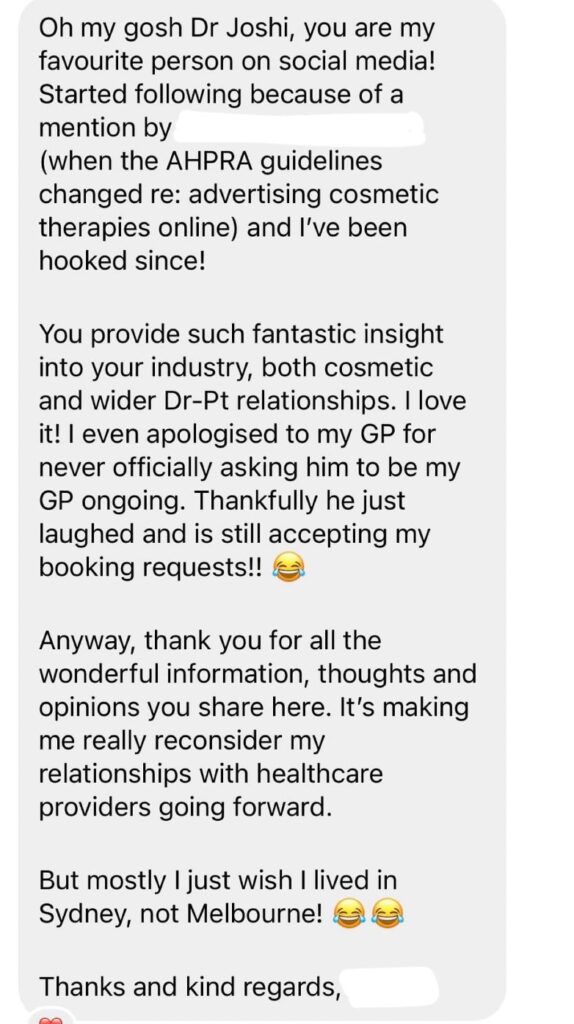We need to keep hammering to convince patients – and even ourselves – of the new general practice reality.
Each week, I see patients in my clinic, many of whom are FRACGPs themselves.
Some days, the universe conspires and it ends up being a healthcare worker kind of day, even if not all of them are doctors, and we spend our time together whinging while sorting out their problems.
With my patients who are also specialist GPs, the common theme is the concern for general practice as a speciality and where it is going.
As I teach my patients in weekly longterm psychotherapy, it is important to remember, when it all seems too hard, to look for the glimmers; these are the small moments of hope that things may just turn out OK.
So what are some glimmers I saw last week?
Two specialist (female) GPs who have begun charging everyone, at every consult. “Even if it is concession or discounted rate, I want them to get their wallet out at the front desk” and it has made their lives easier. A boundary set.
A very talkative patient told me she’d booked in a brief appointment with her regular GP. Instead of being allowed to talk for an hour about this and that, she was “shoved out of there”, in her words, when her concern had been addressed, with the GP saying: “I have a surgery full of patients to see and we don’t have time!” Another boundary.
A patient whom I began seeing as a medical student, who is now a junior doctor, who would agonise with me over the time we’ve been working together about whether to apply for a whole-person speciality such as general practice, who told me she’d applied and got in and was excited; and who intends to “bill appropriately – we have bills to pay too”.
And the best of all, perhaps: patients coming in to tell me they watch (and enjoy!) my rants on social media about the politics of health, and on the rights of healthcare workers to decide if they want to work with patients or not, and who tell me “keep doing it” when I feel I am shouting into the void many days.
To top it off, on the weekend, someone who began following me in July messaged me on one of my social pages – shared with consent here:

My business coach tells me, repeatedly, that it takes on average 8-10 attempts to convey a message for people to hear it for the FIRST time.
I admit I have been rather relentless in my messaging and advocacy for the rights of specialist GPs and doctors, and healthcare workers at large in recent years. It has not always been positive and the backlash some days can be severe, enough to make me consider pausing.
But, as I say to my patients, it is important to keep speaking up for what is important to you (and YOU need to be part of that equation) and to keep going. Hate often means you are challenging people, it often means you are making people uncomfortable and they dislike it. But that is on them, not you.
So while I have had many thoughts and many drafts about the ongoing challenges of general practice and health in totality these days, I feel it is important to remember, especially as we head towards November when the mostly insufficient bulk billing incentive kicks in, and there will be renewed pressure for many of us to capitulate, to hold firm.
- It is OK to charge appropriately for good, even excellent care
- It is OK to say no to patients who are hard work simply because they can be or want to be, barring emergency
- It is OK to prioritise your own mental health
- It is OK to say no
- It is OK to have boundaries, ESPECIALLY when people push back against them. Their pushing back means the boundary was needed, not that you should capitulate
Perhaps if we get better at this, more of us will consider general practice as a speciality to work in.
Perhaps if we get better at this, more of us will choose to excel in our chosen speciality instead of dreaming of greener grass in other areas just because it seems easier.
Happiness, contentment is an inside job. If we lack the appropriate internal locus of control, nothing and nowhere will make us happy because we will carry the same dysfunctional mindset and attitude into the new job, no matter how lucrative.
Times are changing, it may seem at a glacial pace, but they are. I hope more, if not most of us, are leaning into it instead of leaving, and doing the inside work needed to help our speciality not only survive but eventually thrive.
Dr Imaan Joshi is a Sydney GP; she tweets @imaanjoshi.





